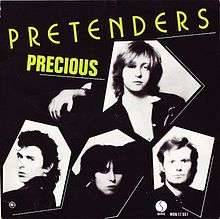Precious (Pretenders song)
| "Precious" | ||||
|---|---|---|---|---|
 Cover in the Netherlands | ||||
| Single by The Pretenders | ||||
| from the album Pretenders | ||||
| B-side | "Stop Your Sobbing" | |||
| Released | 1980 | |||
| Format | 7" single | |||
| Recorded | 1979 | |||
| Genre | Punk rock | |||
| Length | 3:36 | |||
| Label | Warner Music Group | |||
| Writer(s) | Chrissie Hynde | |||
| Producer(s) | Chris Thomas | |||
| The Pretenders singles chronology | ||||
| ||||
"Precious" is a song written by Chrissie Hynde that was first released on the Pretenders' 1980 debut album Pretenders. It was the opening track of the album. It was also released as a single in some countries. A medley of "Precious" with "Brass in Pocket" and "Mystery Achievement" reached #28 on the Dance Music/Club Play Singles chart.[1]
Allmusic critic Stewart Mason described "Precious" as Hynde's "true calling card."[2] He also describes it as "a poison-pen valentine to Hynde's home city of Akron, Ohio."[2] Allmusic critic Stephen Thomas Erlewine praised James Honeyman-Scott's "phased, treated guitar" playing for how it supplements the "pounding rhythm."[3] Music critic Simon Reynolds described the lyrics as a "strafing stream of syllables" mixing "speed rap, jive talk, baby babble," and the song as "punk scat, all hiccoughs, vocal tics, gasps and feral growls, weirdly poised between love and hate, oral sensuality and staccato, stabbing aggression."[4]
Mason notes that the music of "Precious" maintains some restraint, but still sounds more threatening than other songs which sound angrier.[2] The climax of "Precious" comes when Hynde sings the line "But not me, baby, I'm too precious/Fuck off!"[2] SPIN critic Charles Aaron noted that Hynde's singing this line "over whipsaw guitars" made it clear that Hynde "was more than a bewitching pout."[5] Rolling Stone Magazine critic noted that he gets "startled and shivery when Hynde rejects a would-be lothario" with this line.[6] According to Mason, the restraint until that point makes this climax "more explosive."[2] According to Rolling Stone critic Bud Scoppa, the line was actually supposed to be "But not me, baby, I'm too precious/I had to fuck off" but Hynde swallowed the words "I had to."[7] Scoppa also notes the "fearlessness" with which Hynde sings this line.[7] Ariel Swartley wrote in Mother Jones about the cathartic effect of this line for women in dance clubs:
Dozens of women, otherwise amicably engaged with partners, would stop short and mouth along with Hynde's switchblade-sharp delivery of her famous "Fuck off" line. (Predictably, there were men on the same dance floor bemoaning Hynde's "macho" stance, so different from the women they knew. Hmmm.)[8]
Author Mike Segretto described "Precious" as being "particularly ferocious."[9] Author Tom Moon called it an "enduring gem."[10]
A live version of "Precious" was included on the 1981 EP Extended Play.[11] Village Voice critic Robert Christgau considered the live version even better than the original.[12] Mason also praised the live version.[2] A demo version from 1978 was included on the 2006 album Pirate Radio.[13] Erlewine stated that this demo version was "nearly as tough" as the officially released version.[13] "Precious" was later included on the 2009 compilation album The Best of Pretenders.[14]
Mr. Stress, referenced in the line "Now Howard the Duck and Mr. Stress both stayed", is the stage name of the Cleveland blues musician Bill Miller.[15] Hynde briefly became a member of the Mr. Stress Blues Band, but Miller felt that Hynde's interest in original rock music didn't fit in with what Miller wanted to do, which was traditional blues. In an interview, Miller claimed that he told Hynde she would "probably have to go to Europe to get anyone to listen to you."[16]
References
- ↑ "Pretenders awards". Allmusic. Retrieved 2014-06-11.
- 1 2 3 4 5 6 Mason, S. "Precious". Allmusic. Retrieved 2014-06-11.
- ↑ Erlewine, S.T. "Pretenders". Allmusic. Retrieved 2014-06-11.
- ↑ Reynolds, S. (1996). The Sex Revolts: Gender, Rebellion, and Rock 'n' Roll. Harvard University Press. p. 239. ISBN 9780674802735.
- ↑ Aaron, C. (February 2002). "The 50 Greatest Bands". SPIN. p. 74. Retrieved 2014-06-11.
- ↑ Tucker, K. (April 17, 1980). "Pretenders". Rolling Stone Magazine. Archived from the original on November 7, 2007. Retrieved 2014-06-11.
- 1 2 Scoppa, B. (November 11, 2004). "Pretenders". Rolling Stone Magazine. Archived from the original on February 7, 2008. Retrieved 2014-06-11.
- ↑ Swartley, A. (June 1982). "Girls! Live! On Stage!". Mother Jones. pp. 25–31. Retrieved 2014-06-11.
- ↑ Segretto, M. (2014). The Who FAQ. Hal Leonard. ISBN 9781480392526.
- ↑ Moon, T. (2008). 1,000 Recordings to Hear Before You Die. Workman Publishing. p. 611. ISBN 9780761149415.
- ↑ Ruhlmann, W. "Extended Play". Allmusic. Retrieved 2014-06-11.
- ↑ Christgau, R. "Pretenders". robertchristgau.com. Retrieved 2014-06-11.
- 1 2 Erlewine, S.T. "Pirate Radio". Allmusic. Retrieved 2014-06-11.
- ↑ Monger, J.C. "The Best of the Pretenders/Break Up the Concrete". Allmusic. Retrieved 2014-06-11.
- ↑ Henke, James. "Blues Legend Returns to the Heights" (PDF). Heights Observer. Retrieved 2014-08-21.
- ↑ Petcovic, John. "Bluesman Miller's gigs prove stresses won't slow him down". The Plain Dealer. Retrieved 2014-08-21.